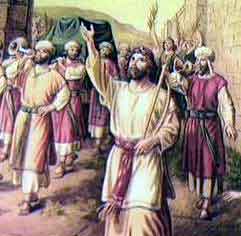Today’s long post is part of our series on teaching character to children. Next week I’ll show why understanding worship is essential to teaching character. ~Anne

I used to believe that worship was praise, singing, thinking about God and His attributes, sitting quietly and revering Him. Worship was communing with God, sitting alone in His presence, and concentrating on Him.
However, when studying what the Bible said about worship, my views radically changed. When I was a little girl, I used to wish that our religion was more similar to other world religions. I would pretend that the back of my closet was a temple to God. I would enter and pretend to worship, bringing imaginary gifts, bowing and singing. It seems from my study of God’s Word that maybe my young imaginations were closer to reality than I would have thought.
It seems that we are all born with a deep desire to worship God. We are born with a desire, not only to fellowship with Him, but also to humble ourselves before something or someone greater than ourselves, to worship, honor and utterly pour out our lives in service to God. All over the world, peoples have willingly turned away from the one, true Creator God. Yet still this desire to worship urges them to worship something, even if it is only a created thing, a heavenly body, an idol made of stone or metal, an idea, or a force. We all worship. Sadly, whenever our worship is misplaced, our desire for God remains and eats away within us.
Note: You will receive the most benefit by looking up each of these references as you read.
God warns us that we will be tempted to worship other gods (Deuteronomy 11:16). He says we will be tempted to worship the sun, moon, stars, or things God has made (Deuteronomy 4:19). We will have the urge to love, serve, follow, consult with, and worship everything but God (Jeremiah 8:2). The Bible says that in reality, we will actually be worshiping demons (Revelation 9:20) and ultimately, Satan himself (Luke 4:7). Satan lies to us and promises he can give the splendor of the world to anyone who worships him. Yet God warns us to only worship Him. In fact, when we willfully choose to worship anything but God, we bring the penalty of death upon ourselves.
God will not allow Himself to be replaced in our lives. He promises that one day all people will worship Him. In Revelation, the twenty-four elders in front of God’s throne fall down and worship Him. However, all nations, even the heathen kings of the earth, will also fall down with fear before Him (Psalm 2:11). Both Jew and Gentile, believer and unbeliever, small and great, will fall down before God Almighty in worship, with all the hosts of God’s angels.
What will forcefully be required of all someday is beautiful when it comes willingly today.
To worship means to bow, to prostrate to the ground, and to serve. In addition, worship always seems to be coupled with a willing sacrifice of something dear to us.
The first act of worship recorded in the Bible was only hinted at. After Adam and Even sinned, “the Lord God made garments of skin for Adam and his wife and clothed them” (Genesis 3:21). This is the first record of death in the Bible, as God slew an animal that Adam had just named and was most likely precious to him. In Leviticus 1:3-4, we read that when a man brought an animal from his own flock or herd to YHWH, he was to lay his hand on its head and then to slaughter it, skin it, and cut it into pieces before turning it over to Aaron’s sons. What a deterrent to sin that must have been! The animal’s trusting eyes, its cry as it was slaughtered, the sight and smell of blood that would linger in a man’s nostrils – these would all remind Adam that sin has consequences and that he deserved to die in that animal’s place.

While anyone can sacrifice and while our hearts can grow cold to the sights and sounds of death, Scripture reminds us that a sacrifice is not worship unless repentance and a genuine desire to obey are also evident (Psalm 66:16-20). King Saul disobeyed God’s command to destroy all the Amalekites (1 Samuel 15:1-3, 9-10), then proceeded to offer a sacrifice which was of no cost to him (verse 15). Samuel would not worship with him (verses 24-26). Instead, he told him, “Does YHWH delight in burnt offerings and sacrifices as much as in obeying the voice of YHWH? To obey is better than sacrifice, and to heed is better than the fat of rams. For rebellion is like the sin of divination, and arrogance like the evil of idolatry” (verses 22-23).
Even though Saul went on to make a pretense of worshiping YHWH (verses 30-31), the Bible tells us, “The gifts and sacrifices being offered were not able to clear the conscience of the worshiper” (Hebrews 9:9). Worship is designed to show our willingness to obey God’s instruction (Exodus 12:27 is one example). When God commands, we bow down and worship, then we obey.
In fact, worship is always a response to what God does.
- When God answers prayer, we bow and worship (1 Samuel 1:19, Genesis 24:26).
- When God leads in our lives, we bow and worship (Exodus 33:10).
- When we receive terrible news, we bow and worship (Job 1:20).
- When God provides for our physical needs, we bow and worship (Deuteronomy 26:10).
- When God lays the secrets of our hearts bare, we bow and worship (1 Corinthians 14:25).
- When God’s righteous acts are revealed, we bow and worship (Exodus 4:31, 2 Chronicles 7:3, Revelation 15:4).
- When we see the splendor of God’s creation, we bow and worship (Revelation 14:7). (Note: This is probably why burnt offerings were given every Sabbath day: to show honor for God’s creation, Exodus 20:11.)
Worship tells God that we are in agreement with Him. Worship shows that we acknowledge His power and that we need Him.
- We worship through prayer (Exodus 34:8, Philippians 4:6-7).
- We worship when we acknowledge not only our sin but our acceptance of the consequences of our sin (2 Samuel 12:20).
- We should worship as the Israelites did after spending many hours listening to God’s law being read and confessing their sin (Nehemiah 9:3).
- We worship after hearing praise to God and by lifting our hands to Him in agreement (Nehemiah 8:6). We worship to show our belief (John 9:38).
Worship has some specific characteristics, called “regulations for worship” (Heb. 9:1).
- First of all, when we worship God, we bow down, falling to our knees, with our heads to the ground, prostrate before Him (Genesis 47:31, Exodus 4:31, Psalm 95:6, Nehemiah 8:6, Revelation 4:10, Revelation 19:10, Daniel 3:5, Matthew 28:9, etc.).
- Burnt offerings, sacrifices, and offerings of our first fruits accompany worship and seem to define the very core of worship (1 Chronicles 16:29, Ezekiel 46:2).
- God prescribed specific times for worship in His law (1 Samuel 1:3, Zechariah 14:16, John 12:20), and those times were observed even by the apostles (Acts 8:27, Acts 24:1). In no way should any worship be contrary to God’s law (Acts 18:13).
- Worshipful sacrifices should be given with a willing heart (2 Chronicles 29:31).
Music accompanies worship, and men composed different songs for different purposes (1 Chronicles 16:37, 2 Chronicles 29:27-31, Nehemiah 12:45-47, Psalm 66:4, Daniel 3:5). Psalm 95 is a great example of worship, saying,
Come, let us sing for joy to YHWH;
let us shout aloud to the Rock of our salvation.
Let us come before him with thanksgiving
and extol him with music and song.
For YHWH is the great God,
the great King above all gods.
In his hand are the depths of the earth,
and the mountain peaks belong to him.
The sea is his, for he made it,
and his hands formed the dry land.
Come, let us bow down in worship,
let us kneel before YHWH our Maker;
for he is our God
and we are the people of his pasture,
the flock under his care.
Singing, shouting, music and song all accompany worship. Most of all, thanksgiving and praise should accompany our worship (2 Chronicles 7:3, Philippians 4:6-7). When we “tremble in the splendor of His holiness” (Psalm 96:9) and recognize who He is (Matthew 4:10), the result is a life of thanksgiving and praise, offered to God as a living sacrifice (Romans 12:1, Isaiah 6:1-8).

In worship, we follow the example of Abraham who offered his most precious possession, his son Isaac, as a sacrifice (Genesis 22:5). We offer our own bodies, laying no claim to any right over our own destinies.
- We offer a life that is holy and acceptable unto God (Romans 12:1), without blemish (Leviticus 1:3).
- Our offering is voluntary (Leviticus 1:3, 2 Chronicles 29:31).
- Our lives are dead to our own sinful desires (Leviticus 1:5, Romans 6:1-2).
- Our lives are broken (Leviticus 1:6, Psalm 51:17).
- Finally, God accepts only a complete sacrifice, offered with our whole hearts, with nothing held back (Leviticus 1:9, 2 Chronicles 15:15, Psalm 9:1, Psalm 111:1, Psalm 138:1, Jeremiah 3:10, Jeremiah 24:7, Mark 12:33; see also Psalm 119:2, 10, 34, 58, 69, 145).
Note: I did a simultaneous study of Psalm 119 and was amazed at the blessings promised to those who meditate upon God’s Law. David, the author of Psalm 119, would have known God’s Law as the first five books of the Bible, the same books that show us the system of worship and sacrifice ordained by God and fulfilled in His Son, Jesus Christ.
“The first covenant had regulations for worship and also an earthly sanctuary,” according to the author of Hebrews (Hebrews 9:1). God’s people worshiped Him when He gave them His covenant at Mount Sinai (Exodus 3:12, Exodus 24:1). In this covenant, God set up a way for man on earth to worship God.
Yet even earlier, from the time of Melchizadek, Jerusalem had been ordained as the place where we should worship God (Genesis 14:18-20). Abraham gave offerings to Melchizadek, king of Salem (Jerusalem), and Jesus Christ is our high priest after the order of Melchizadek, rather than the order of the Levitical priesthood (Hebrews 5:6, Hebrews 6:20, Psalm 110:4). It is through this priesthood that we draw near to God (Hebrews 7:19).
- Abraham offered Isaac in this same location, known in that time as Mount Moriah (Genesis 22:2).
- Abraham told Isaac that on that mount, God would provide a lamb for the sacrifice (Genesis 22:8).
- King David later bought a threshing floor in Jerusalem and brought the ark of God there (2 Samuel 6).
- Jerusalem is also known as Mount Zion and is the location of the Mount of Olives. David himself continued to worship God on the Mount of Olives (2 Samuel 15:32).
- Solomon built a temple to God in that location, and people continued to worship God before the altar in Jerusalem (2 Kings 18:22, Isaiah 36:7) and in the courts of His temple (Psalm 96:8-9, Jeremiah 7:2).
- In the future, God’s people will again worship God at a new temple to be built in Jerusalem (Ezekiel 46:9).
Archaeological evidence shows that Jesus the Messiah was offered up as a sacrifice for sin on Mount Moriah in Jerusalem, in fulfillment of every prophecy. When our Messiah returns to this earth, He will come back to Mount Zion, and every knee will bow to Him there. The righteous ones will reign as priests of God there for 1,000 years (Revelation 20:6, Isaiah 60-62, especially 60:6, and Isaiah 66:21).

The book of Hebrews says that the ordinances of worship instituted at Sinai are only an earthly picture of a heavenly tabernacle. They are a copy of the true tabernacle set up by God in heaven (Hebrews 8:2, 5). Moses was instructed to make everything according to the pattern God gave him (Hebrews 8:5).
“When Christ came as high priest of the good things that are already here, he went through the greater and more perfect tabernacle that is not man-made, that is to say, not a part of this creation” (Heb. 9:11).
“For Christ did not enter a man-made sanctuary that was only a copy of the true on; he entered heaven itself, now to appear for us in God’s presence” (Heb. 9:24).
“The Law is only a shadow of the good things that are coming – not the realities themselves” (Heb. 10:1).
“He said, ‘Sacrifices and offerings, burnt offerings and sin offerings you did not desire, nor were you pleased with them’ (although the Law required them to be made). Then he said, “Here I am, I have come to do your will.’ He sets aside the first to establish the second. And by that will, we have been made holy through the sacrifice of the body of Jesus Christ once for all. Day after day every priest stands and performs his religious duties; again and again he offers the same sacrifices, which can never take away sins. But when this priest had offered for all time one sacrifice for sins, he sat down at the right hand of God. Since that time he waits for his enemies to be made his footstool , because by one sacrifice he has made perfect forever those who are being made holy. The Holy Spirit also testifies to us about this. First he says: ‘This is the covenant I will make with them after that time, says the Lord. I will put my laws in their hearts, and I will write them on their minds.’ Then he adds: ’Their sins and lawless acts I will remember no more.’ And where these have been forgiven, there is no longer any sacrifice for sin” (Heb. 10:8-18).
In the heavenly tabernacle, there will no longer be any sacrifice for sin. Hebrews 9:10 says that the earthly regulations for worship will only apply until the time of the new order. Hebrews 8:13 says that the obsolete and aging covenant will “soon disappear,” a phrase that sounds as if it is still future tense. Acts 3:21 says that Jesus “must remain in heaven until the time comes for God to restore everything, as he promised long ago through his holy prophets.” The Law provided for an offering for sin because we continually transgress His Law. But a day is coming, when His law will be in our hearts and we will transgress it no longer.
“The time is coming, declares the Lord,
when I will make a new covenant
with the house of Israel
and with the house of Judah.
It will not be like the covenant
I made with their forefathers
when I took them by the hand
to lead them out of Egypt,
because they did not remain faithful to my covenant,
and I turned away from them, declares the Lord.
This is the covenant I will make with the house of Israel
after that time, declares the Lord.
I will put my laws in their minds
and write them on their hearts.
I will be their God,
and they will be my people.
No longer will a man teach his neighbor,
or a man his brother, saying, ‘Know the Lord,’
because they will all know me,
from the least of them to the greatest.
For I will forgive their wickedness
and will remember their sins no more” (Hebrews 8:8-12).Then I saw a new heaven and a new earth, for the first heaven and the first earth had passed away, and there was no longer any sea. I saw the Holy City, the new Jerusalem, coming down out of heaven from God, prepared as a bride beautifully dressed for her husband. And I heard a loud voice from the throne saying, “Now the dwelling of God is with men, and he will live with them. They will be his people, and God himself will be with them and be their God. He will wipe every tear from their eyes. There will be no more death or mourning or crying or pain, for the old order of things has passed away” (Rev. 21:1-4).
But the cowardly, the unbelieving, the vile, the murderers, the sexually immoral, those who practice magic arts, the idolaters and all liars—their place will be in the fiery lake of burning sulfur. This is the second death” (Rev. 21:8).
I did not see a temple in the city, because the Lord God Almighty and the Lamb are its temple (Rev. 21:22).
Nothing impure will ever enter it, nor will anyone who does what is shameful or deceitful, but only those whose names are written in the Lamb’s book of life (Rev. 21:27).
No longer will there be any curse. The throne of God and of the Lamb will be in the city, and his servants will serve him (Rev. 22:3).
Blessed are those who wash their robes, that they may have the right to the tree of life and may go through the gates into the city. Outside are the dogs, those who practice magic arts, the sexually immoral, the murderers, the idolaters and everyone who loves and practices falsehood (Rev. 22:14-15).
In that day, we will worship at God’s footstool (Psalm 99:5, Revelation 4:10-11) in His holy city of Jerusalem, but no temple or sacrifice for sin will be made. We will no longer need a priesthood.
This is what YHWH says:
“Heaven is my throne,
and the earth is my footstool.
Where is the house you will build for me?
Where will my resting place be?
Has not my hand made all these things,
and so they came into being?”
declares YHWH (Is. 66:1-3a).

The book of Hebrews is a guidebook for worship for us today. We have confidence to worship God before His throne in heaven and “to enter the Most Holy Place by the blood of Jesus” (Hebrews 10:19). It gives us several instructions that we should follow because of the privileges bought for us by Christ our high priest.
- First, we worship by holding “unswervingly to the hope we profess, for he who promised is faithful” (Hebrews 10:23, 1 Peter 1:13). Worship is remembering God’s righteous acts (Revelation 15:4) and believing that He will fulfill His Word (John 9:38-39).
- We also worship by spurring one another on toward love and good deeds (Hebrews 10:24, Nehemiah 9:3, Psalm 132:9, Philippians 3:9, Romans 12:1, 1 Peter 1:14-15). Worship is not simply a ceremonial coming before God. Worship is also the practical daily life of holiness, offered as a pleasing sacrifice to God. Hebrews 10 goes on to say that we do this corporately as a local body of Christ, by meeting together and encouraging one another (Hebrews 10:25, 1 Peter 1:17-2:1). The book of 1 Peter is a mirror of these instructions, going on to give specific instructions for a holy life lived out in the church and home.
Since we worship God in “a kingdom that cannot be shaken,” we worship God with thankfulness, reverence and fear (Hebrews 12:28). This is worship that is acceptable to God.
There will be no temple in God’s new kingdom (Revelation 21:3, 22) for because of Christ, God will dwell (temple) with men and live with them. In this current time, 1 Corinthians 3:16-17 says that we, His church, are God’s temple and that God’s spirit lives in us. 1 Corinthians 5-6 show that we should not allow sin in the local assembly, but we should judge it and expel it (1 Corinthians 5:4-13) because the church is the body of Christ (Ephesians 5:25-32) and is His holy temple (1 Corinthians 6:19-20). It is in this way that we, as a corporate, local body of Christ, can worship “with reverence and awe” (Hebrews 12:28), knowing the God is a “consuming fire” against sin.

Hebrews 13 continues by telling us that acceptable worship is carried out in the local assembly in the following ways:
- By loving each other as brothers (v. 1).
- By entertaining strangers (v. 2).
- By remembering those in prison and those who are mistreated (v. 3).
- By honoring marriage (v. 4).
- By keeping our lives free from the love of money and by being content (v. 5-6).
- By remembering our spiritual leaders and imitating their faith (v. 7-8).
- By not being carried away by all kinds of strange teachings (v. 9-12).
- By bearing the disgrace of Christ (v. 13-14).
- By offering continually a sacrifice of praise as the fruit of our lips (v. 15).
- By offering the sacrifice of good deeds and sharing with others (v. 16).
- By obeying our leaders, submitting to their authority (v. 17).
- By praying for others (v. 18).
These are all forms of acceptable worship to our God, for “with such sacrifices God is pleased” (v. 16).
In conclusion, Deuteronomy 11:16 warns us, “Be careful, or you will be enticed to turn away and worship other gods and bow down to them.” It advises us to “fix these words of mine in your hearts and minds” (Deuteronomy 11:18). It lists practical ways to remind ourselves and our children of God’s laws (Deuteronomy 11:18-21). Worshiping God is obeying His commands and loving YHWH your God and serving Him with all your heart and with all your soul (Deut. 11:13). Worship is summarized,
Therefore, I urge you, brothers, in view of God’s mercy, to offer your bodies as living sacrifices, holy and pleasing to God—this is your spiritual act of worship. Do not conform any longer to the pattern of this world, but be transformed by the renewing of your mind. Then you will be able to test and approve what God’s will is—his good, pleasing and perfect will (Rom. 12:1-2).
Love to others is worship’s exhibit.
Love does no harm to its neighbor. Therefore love is the fulfillment of the law (Rom. 13:10).
Worship is vertical (thankfulness to God, without murmuring or complaining) and horizontal as well (love to all the brethren). Worship is shown by lives of holiness and obedience, remembering Christ’s sacrifice for my sin (1 Samuel 15:22).
![]()
P.S. I realize this was huge! It was probably like drinking out of a fire hydrant. Were there any little drips of truth that meant a lot to you today?
Thank you for this study, sis…I just got a chance to scan it…may copy it out so I can read it in depth…it looks awesome!
A fire hydrant is right—as far as the impact it had on my heart! And I don’t mean that it put out the fire, but just the opposite. Thank you for sharing with us.
Oh my, Anne. This was so intense and EXACTLY what I needed! Thank you dearly, from the depth of my heart. You are obedient in the amazing teachings that YHWH has impressed on your heart. Thank you for being obedient to HIS calling.
It was a very intense study that my friend and I did together, with prayer and fasting, back in maybe 2007 or 2008? It had a big impact on me!
your documents really helpful in my personal studies… Thank God for your auspicios work. God bless you.
You say the sacrifices won’t come back during the kingdom. Do you mean when the old earth passes and the new comes? I am asking because Ezekiel 40-44 clearly state the sacrifices are returning for the millennial reign of Yeshua.